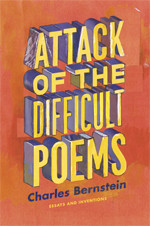
Fraud’s phantoms: Czernin and Schmatz
from Attack of the Difficult Poems

This is an excerpt from "Fraud’s Phantoms: A Brief Yet Unreliable Account of Fighting Fraud with Fraud (No Pun on Freud Intended), with Special Reference to the Poetics of Ressentiment" from Attack of the Difficult Poems: Essays and Inventions
In the early summer of 1986, two young Austrian poets, Franz Josef Czernin and Ferdinand Schmatz, had the idea to write poems that closely resembled the poems they found most typical and at the same time most deplorable in contemporary poetry volumes, for example the work of Rainer Kunze, Günther Kunert, and Sarah Kirsch. At first they had the idea to call the poet Irene Schwaighofer (silent court), a poet born in a little town in upper Austria, who, familiar through schooling with the tenets of modernism, would need no time to forge her own distinctive style and upon being published would proceed to win many prizes and much praise. However, Czernin and Schmatz felt this process would take too long and in order to shorten the “difficult and boring” process, decided to give authorship of the poems to Czernin. They completed the work in a few weeks and the book was immediately accepted for publication under the title Die Reise (the journey). The book received positive attention, some of which suggested that at last Czernin has given up his thrashing about in the waters of experimentation and found a more profound and authentic voice. When Czernin broke the news of his own duplicitous relation to the poems in Der Spiegel in March 1987, a furious hale of criticism descended upon him, not the least from the publisher of the book, who felt he had been betrayed. Later the same year, Czernin and Schmatz published a book-length account of the story together with exchanges between them and several interlocking essays.
Here is of one of the poems from Die Reise: In achtzig Gedichten um die ganze Welt:
fahr-plan
ist mein blick
nicht eine schere,
deren beine
schritte machen,
die alle fernen
auseinanderschneiden?
hat denn die schere
keine augen,
die zu ringen werden
jener finger,
die auf ihre ziele zeigen?
und gehen diese ziele
nicht auf zwei füssen,
deren zehen
auf nägel treten,
die meine ganze reise
zusammennageln?[1]
agenda
is my glance
not a scissor
whose leg
makes steps
that cut through
all distances?
had, then, this scissor
no eyes
which will strive
to finger
loins of desire?
and will not such loins
walk on two feet
whose toes
tread on pins
fastening together
my whole journey?
Schmatz and Czernin created a literary scandal with this and the other poems in the collection, but they were able to focus the discussion of issues of quality and judgment and to avoid the more abusive aspects of the Ern Malley and Yasusada hoaxes. Indeed, Die Reise is motivated by a desire to critique the jargon of authenticity rather than to reinscribe it, as we find in the Yasusada case. There is no claim here that these are necessarily good poems or that we should look to the “poems themselves” for the meaning. The texts here have meaning in relation to the literary valuations into which they make an intervention; their meaning is social and diacritical. Indeed, late in 1987, Schmatz and Czernin published Die Reise: In achtzig flachen Hunden in die ganze tiefe Grube, a book about the affair in which they address explicitly the questions of authorship and motivation. In this book, Czernin describes Die Reise as a form of literary self-criticism. “Perhaps one must, to make a better poem, know how one makes a worse poem,” he writes. “I think it was Novalis who said that good literature is made from worse literature. He was right that there must be, in any case, worse poetry from which better poetry can originate, whereas for me it is self-evident that the contrary can also be valuable.”[2] Die Reise, then, can be understood as an investigation of aesthetic judgment. And yet, as the Ern Malley poems also show, what is written out of a desire to expose the limits of a particular style (or rhetoric) may ultimately become exemplary of unrealized potential in the style; ironizing of the style may create a thickening of the artifice and with it an intensification of the aesthetic experience. Over time, the poems of Die Reise take on charm that goes beyond parody. In any case, Czernin is not asserting the objectivity of any such judgments but rather that “every objectivity is fictional.” His purpose then, as befits a poet who has written a study of Karl Kraus, is satiric adjudicative: the fraud remains a fraud.
[1] Franz Josef Czernin, Die Reise: In achtzig Gedichten um die ganze Welt (Salzburg und Wien: Residenz Verlag, 1987), p. 30.
[2] Franz Josef Czernin, “Die Verdopplung des Igels,” in Czernin and Ferdinand Schmatz, Die Reise: In achtzig flachen Hunden in die ganze tiefe Grube (Linz-Wien, Austria: Edition Neue Texte, 1987), p. 21